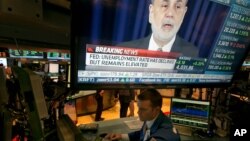WASHINGTON —
The U.S. central bank has decided to start trimming back its direct support of the American economy.
For more than a year, the Federal Reserve has been buying $85 billion of securities a month in an effort to keep interest rates low and boost job growth. With the world's largest economy advancing steadily, Fed policy makers Wednesday said they would cut the asset purchases to $75 billion a month, starting in January.
Fed chairman Ben Bernanke said policy makers now believe the U.S. economy will continue to advance, although it has much farther to go "before conditions can be judged normal." Even so, he predicted the country's labor market will continue to improve, after adding nearly 3 million jobs since the asset purchases were started in September 2012.
"With fiscal restraint likely diminishing, with signs that healthful spending is picking up, we expect economic growth to be strong enough to support further job gains," said Bernanke.
Investors showed their approval of the Fed policy shift, with key stock indexes on New York exchanges surging more than 1 percent in the first hour after the central bank made its announcement.
In a statement, the central bank said it sees "improvement in economic activity and labor market conditions" in recent months that are "consistent with growing underlying strength in the broader economy."
The policy makers said they expect to cut the asset purchases further in "measured steps" in the coming months, but set no timetable. Bernanke said it would depend on further improvement in the economy.
The Fed also kept its benchmark interest rate at near zero and said it expected to keep it that low "well past the time" when the country's unemployment rate, now at 7 percent, falls below 6.5 percent.
The central bank has for months been weighing whether to trim its economic stimulus measures, but has backed off when one economic trend or another has fallen.
Economist Mark Vitner at Wells Fargo Bank says that many of the conditions that Fed policy makers cited in September as a reason to not cut the securities purchases have now diminished.
"There's less political uncertainty. There's still political uncertainty, but there's much less than there was then. Chances of a government shutdown early next year have gone down considerably since we got the budget deal. And the economy looks a lot stronger. Most of the economic news that we've gotten has not only come in stronger than expected, but some of it has come in much stronger than expected," said Vitner.
Bernanke is in his final weeks of an eight-year tenure as chief of the world's most powerful central bank, a period in which the U.S. economy sustained its biggest downturn since the Great Depression of the 1930's.
Fed vice chair Janet Yellen, who voted for the cut in asset purchases, has been nominated to replace Bernanke in February and could win Senate confirmation in the coming days.
For more than a year, the Federal Reserve has been buying $85 billion of securities a month in an effort to keep interest rates low and boost job growth. With the world's largest economy advancing steadily, Fed policy makers Wednesday said they would cut the asset purchases to $75 billion a month, starting in January.
Fed chairman Ben Bernanke said policy makers now believe the U.S. economy will continue to advance, although it has much farther to go "before conditions can be judged normal." Even so, he predicted the country's labor market will continue to improve, after adding nearly 3 million jobs since the asset purchases were started in September 2012.
"With fiscal restraint likely diminishing, with signs that healthful spending is picking up, we expect economic growth to be strong enough to support further job gains," said Bernanke.
Investors showed their approval of the Fed policy shift, with key stock indexes on New York exchanges surging more than 1 percent in the first hour after the central bank made its announcement.
In a statement, the central bank said it sees "improvement in economic activity and labor market conditions" in recent months that are "consistent with growing underlying strength in the broader economy."
The policy makers said they expect to cut the asset purchases further in "measured steps" in the coming months, but set no timetable. Bernanke said it would depend on further improvement in the economy.
The Fed also kept its benchmark interest rate at near zero and said it expected to keep it that low "well past the time" when the country's unemployment rate, now at 7 percent, falls below 6.5 percent.
The central bank has for months been weighing whether to trim its economic stimulus measures, but has backed off when one economic trend or another has fallen.
Economist Mark Vitner at Wells Fargo Bank says that many of the conditions that Fed policy makers cited in September as a reason to not cut the securities purchases have now diminished.
"There's less political uncertainty. There's still political uncertainty, but there's much less than there was then. Chances of a government shutdown early next year have gone down considerably since we got the budget deal. And the economy looks a lot stronger. Most of the economic news that we've gotten has not only come in stronger than expected, but some of it has come in much stronger than expected," said Vitner.
Bernanke is in his final weeks of an eight-year tenure as chief of the world's most powerful central bank, a period in which the U.S. economy sustained its biggest downturn since the Great Depression of the 1930's.
Fed vice chair Janet Yellen, who voted for the cut in asset purchases, has been nominated to replace Bernanke in February and could win Senate confirmation in the coming days.









